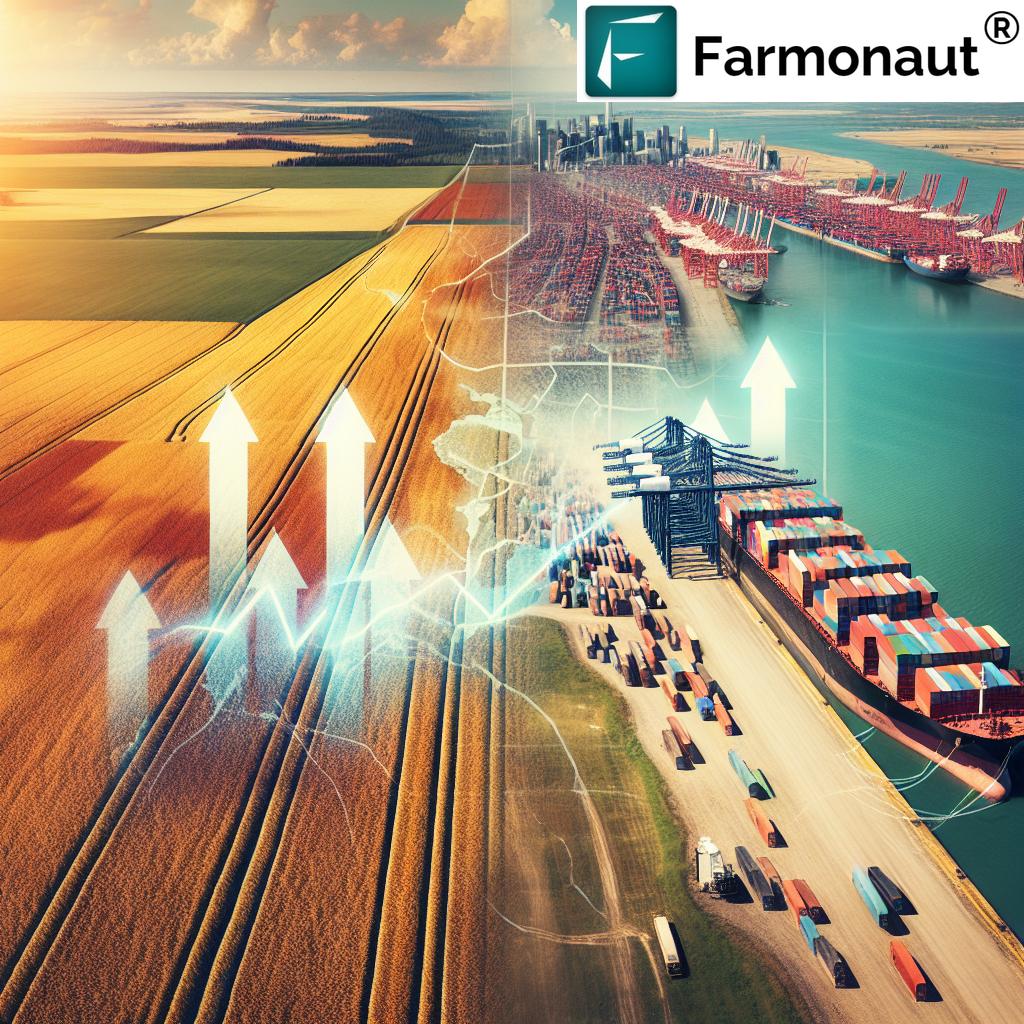WTO Crisis: How Global Agricultural Trade Disputes Impact Canadian Farmers’ Market Access
“The WTO Appellate Body’s crisis affects over $1 trillion in annual global agricultural trade, impacting millions of farmers worldwide.”
In today’s interconnected global economy, the agricultural sector plays a pivotal role in international trade, shaping the livelihoods of millions of farmers worldwide. As we delve into the complex world of global agricultural trade disputes and their impact on Canadian farmers’ market access, we find ourselves at a critical juncture in the history of international trade regulations. The World Trade Organization (WTO), long considered the cornerstone of global trade governance, is facing unprecedented challenges that threaten to disrupt the delicate balance of international agricultural markets.
At Farmonaut, we recognize the importance of staying informed about these global trends and their potential impact on farming communities. Our mission to make precision agriculture accessible and affordable to farmers worldwide aligns closely with the need to understand and navigate the complexities of international trade dynamics. As we explore this topic, we’ll shed light on how the current WTO crisis and ongoing trade disputes are reshaping the landscape for Canadian farmers and agricultural businesses.
The WTO Crisis: A Threat to Global Agricultural Trade
The World Trade Organization, established in 1995, has been instrumental in setting the rules for global trade, including agricultural products. However, recent developments have cast a shadow over its effectiveness, particularly in resolving agricultural trade disputes.
- Appellate Body Dysfunction: The WTO’s Appellate Body, responsible for hearing appeals in trade disputes, has been rendered inoperative due to the United States blocking new appointments. This paralysis threatens the organization’s ability to enforce its rulings effectively.
- Rising Protectionism: Many countries are increasingly resorting to protectionist measures, often in violation of WTO rules, leading to a surge in trade disputes.
- Outdated Regulations: The WTO’s agricultural trade regulations, largely unchanged since the Uruguay Round in the 1990s, are struggling to keep pace with modern farming practices and trade patterns.
These challenges have created a climate of uncertainty in global agricultural markets, with potential far-reaching consequences for farmers and exporters worldwide, including those in Canada.
Impact on International Agricultural Market Trends
The ongoing crisis at the WTO is having a profound effect on international agricultural market trends. Here’s how:
- Market Volatility: Uncertainty surrounding trade dispute resolutions has led to increased volatility in global crop markets, making it challenging for farmers to plan and invest.
- Shift in Trade Flows: As countries engage in bilateral agreements to circumvent WTO challenges, we’re witnessing a realignment of traditional trade flows, potentially opening new markets while closing others.
- Price Fluctuations: Tariffs and trade barriers resulting from unresolved disputes can cause sudden shifts in commodity prices, affecting farm incomes and consumer costs.
For Canadian farmers, these trends translate into a more complex and unpredictable trading environment. The prairie provinces, known for their vast wheat and canola fields, are particularly vulnerable to these global market shifts.
Agricultural Export Policies Under Pressure
As the WTO struggles to maintain its role as the arbiter of global trade, countries are reassessing their agricultural export policies. This shift has significant implications for Canadian farmers:
- Diversification of Export Markets: With traditional markets becoming less reliable, there’s a growing push to diversify export destinations to mitigate risks.
- Non-Tariff Barriers: Countries are increasingly using non-tariff measures, such as sanitary and phytosanitary standards, as de facto trade barriers, complicating export procedures.
- Export Subsidies: Despite WTO agreements to phase out agricultural export subsidies, some countries are finding new ways to support their farmers, potentially distorting global markets.
In this challenging environment, Canadian farmers and exporters must remain agile, adapting their strategies to navigate the evolving landscape of global agricultural trade.

Farm Trade Agreements: A Shifting Landscape
The uncertainty surrounding the WTO has led to a proliferation of bilateral and regional trade agreements. For Canadian agriculture, this means:
- CUSMA (USMCA): The renegotiated North American trade agreement has brought both opportunities and challenges for Canadian farmers, particularly in the dairy and poultry sectors.
- CETA: The Comprehensive Economic and Trade Agreement with the European Union has opened new markets for Canadian agricultural products, including specialty crops and organic produce.
- CPTPP: The Comprehensive and Progressive Agreement for Trans-Pacific Partnership offers potential for increased exports to Asia-Pacific markets.
While these agreements provide some stability, they also introduce new complexities in terms of compliance and market access requirements.
Agricultural Dispute Resolution in Crisis
The paralysis of the WTO’s Appellate Body has left many agricultural trade disputes unresolved, creating a backlog of cases that directly impact market access:
- China-Canada Canola Dispute: The ongoing dispute over canola exports to China highlights the challenges faced when WTO mechanisms are ineffective.
- EU Agricultural Subsidies: Disputes over EU agricultural subsidies remain unresolved, potentially affecting global market prices for key commodities.
- US-Canada Dairy Tariffs: Disagreements over dairy tariffs under CUSMA underscore the complexity of modern trade agreements.
These unresolved disputes create uncertainty for Canadian farmers, making it difficult to plan for future production and investments.
Global Crop Market Analysis: A New Era of Uncertainty
The current state of global agricultural trade has made crop market analysis more challenging than ever. Factors to consider include:
- Geopolitical Tensions: Trade disputes often reflect broader geopolitical conflicts, adding an extra layer of complexity to market predictions.
- Climate Change: Extreme weather events are increasingly impacting crop yields globally, intersecting with trade issues to create new market dynamics.
- Technological Disruption: Innovations in agtech, like those offered by Farmonaut, are changing production patterns and influencing market trends.
For Canadian farmers, staying informed about these global trends is crucial for making informed decisions about crop selection and production volumes.
“Unresolved agricultural trade disputes at the WTO involve products worth over $10 billion, affecting market access for thousands of farms.”
International Agribusiness Regulations: Navigating Complexity
As the WTO’s influence wanes, the landscape of international agribusiness regulations is becoming increasingly fragmented:
- Divergent Standards: Countries are implementing their own agricultural standards, creating a complex web of regulations for exporters to navigate.
- Traceability Requirements: Many markets now demand extensive traceability for agricultural products, adding costs and complexities to the export process.
- Sustainability Criteria: Environmental and sustainability standards are becoming de facto trade requirements in many markets.
Canadian farmers and agribusinesses must adapt to these evolving regulations to maintain and expand their market access. At Farmonaut, we understand the importance of traceability and sustainability in modern agriculture. Our API and blockchain-based solutions can help farmers meet these stringent requirements efficiently.

Agricultural Tariffs and Trade Barriers: A Double-Edged Sword
The proliferation of agricultural tariffs and trade barriers in the wake of WTO challenges presents both threats and opportunities for Canadian farmers:
- Market Access Challenges: Increased tariffs on Canadian agricultural exports to key markets like China and India have reduced competitiveness.
- Domestic Market Protection: Conversely, some Canadian sectors, such as dairy, benefit from protective tariffs under supply management systems.
- Non-Tariff Barriers: Technical regulations, sanitary measures, and labeling requirements are increasingly used as trade barriers, requiring careful navigation.
Understanding and adapting to these tariff and non-tariff barriers is crucial for Canadian farmers looking to maintain and expand their global market presence.
World Agricultural Trade Organization: The Path Forward
As the WTO grapples with its internal challenges, the future of global agricultural trade governance remains uncertain. Possible scenarios include:
- WTO Reform: Efforts to reform the WTO, including its dispute settlement mechanism, could revitalize the organization’s role in agricultural trade.
- Alternative Mechanisms: Regional trade blocs and bilateral agreements may play an increasingly important role in setting agricultural trade rules.
- New Global Framework: There are calls for a new, modernized global framework for agricultural trade that better reflects 21st-century realities.
Canadian farmers and policymakers must remain engaged in these global discussions to ensure their interests are represented in any future trade governance structures.
The Role of Technology in Navigating Global Trade Challenges
In the face of these complex global trade dynamics, technology plays a crucial role in helping farmers adapt and thrive. At Farmonaut, we’re at the forefront of this technological revolution in agriculture:
- Precision Agriculture: Our satellite-based crop health monitoring helps farmers optimize yields and resource use, crucial for maintaining competitiveness in global markets.
- AI-Driven Insights: Our Jeevn AI advisory system provides personalized recommendations, helping farmers make informed decisions in a volatile market environment.
- Blockchain Traceability: Our blockchain-based solutions assist in meeting stringent traceability requirements, opening doors to premium markets.
By leveraging these technologies, Canadian farmers can enhance their productivity and adaptability, crucial traits in navigating the challenges of global agricultural trade.
Explore our solutions:
Global Agricultural Trade Dispute Impact Matrix
| Dispute Type | Countries Involved | Potential Impact on Canadian Farmers | Market Access Implications |
|---|---|---|---|
| Appellate Body Dysfunction | Global (WTO-wide) | High | Increased uncertainty in dispute resolution, potential for unilateral trade actions |
| Agricultural Tariffs | Canada, China, US | High | Reduced competitiveness in key export markets, particularly for canola and soybeans |
| Import Restrictions | Canada, India, EU | Medium | Limited access to growing markets, especially for pulses and specialty crops |
| Subsidies Disputes | Canada, US, EU | Medium | Potential market distortions affecting price competitiveness of Canadian products |
| Sanitary and Phytosanitary Measures | Canada, China, Russia | High | Increased compliance costs, potential for sudden market closures |
Strategies for Canadian Farmers in the Face of Trade Uncertainty
Given the complex and evolving nature of global agricultural trade, Canadian farmers can adopt several strategies to mitigate risks and capitalize on opportunities:
- Diversification: Explore new markets and crop varieties to reduce dependence on any single market or product.
- Value-Added Products: Invest in processing capabilities to move up the value chain and access niche markets.
- Sustainable Practices: Adopt environmentally friendly farming methods to meet growing global demand for sustainable products.
- Technology Adoption: Embrace precision agriculture technologies, like those offered by Farmonaut, to improve efficiency and competitiveness.
- Collaboration: Form cooperatives or joint ventures to share resources and access larger markets.
By implementing these strategies, Canadian farmers can enhance their resilience in the face of global trade uncertainties.
The Future of Canadian Agriculture in Global Markets
As we look to the future, several trends are likely to shape the landscape for Canadian farmers in global agricultural markets:
- Climate Adaptation: Changing weather patterns will necessitate adaptive farming practices and potentially open new agricultural frontiers in Canada.
- Digital Agriculture: The continued integration of technologies like AI, IoT, and blockchain will revolutionize farm management and market access.
- Sustainable Production: Growing consumer demand for sustainably produced food will create new opportunities for Canadian farmers.
- Alternative Proteins: The rise of plant-based and alternative proteins could shift production patterns, particularly in the prairie provinces.
Canadian farmers who stay ahead of these trends and adapt their operations accordingly will be well-positioned to thrive in the evolving global marketplace.
Conclusion: Navigating the Storm
The current crisis in global agricultural trade presents significant challenges for Canadian farmers, but also opportunities for those who can adapt and innovate. As the WTO struggles to maintain its relevance, and new trade agreements reshape market access, staying informed and agile is more crucial than ever.
At Farmonaut, we’re committed to supporting farmers through these turbulent times. Our advanced satellite-based farm management solutions, AI-driven insights, and blockchain traceability tools can help Canadian farmers optimize their operations, meet evolving market requirements, and stay competitive in the global marketplace.
By embracing technology, diversifying markets, and staying attuned to global trends, Canadian farmers can not only weather the current storm in agricultural trade but emerge stronger and more resilient. The future of Canadian agriculture on the global stage is bright, provided we navigate these challenges with wisdom, innovation, and collaboration.
FAQ Section
Q: How does the WTO crisis directly affect Canadian farmers?
A: The WTO crisis impacts Canadian farmers by creating uncertainty in global markets, potentially leading to unresolved trade disputes, increased tariffs, and barriers to market access for Canadian agricultural products.
Q: What are the main agricultural products affected by current trade disputes?
A: Key Canadian agricultural products affected include canola, soybeans, beef, pork, and dairy products, among others, depending on the specific trade disputes and markets involved.
Q: How can Canadian farmers mitigate risks associated with global trade uncertainties?
A: Canadian farmers can mitigate risks by diversifying their markets and products, adopting new technologies for improved efficiency, focusing on sustainable practices, and staying informed about global trade developments.
Q: What role does technology play in helping farmers navigate global trade challenges?
A: Technology, such as Farmonaut’s satellite-based solutions and AI advisory systems, helps farmers optimize production, meet traceability requirements, and make data-driven decisions to remain competitive in global markets.
Q: How might the future of global agricultural trade governance look without a functional WTO?
A: Without a functional WTO, we may see an increase in bilateral and regional trade agreements, potentially leading to a more fragmented global trade landscape with varying rules and standards across different markets.






